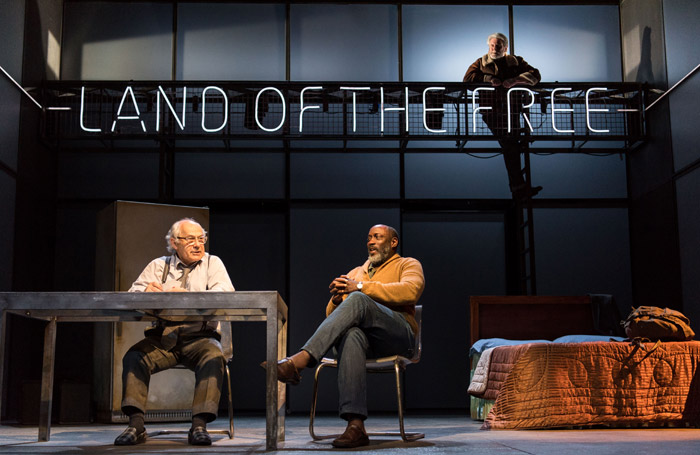Scotland has already staged one major production of Arthur Miller’s 1949 masterpiece this year. Dundee Rep’s superlative version swept the board at last month’s CATS. As welcome as it is to have another opportunity to see this modern great, it’s hard to see Royal & Derngate‘s touring production having the same impact.
Partly, this is down to its troubled genesis. An actual death casts its sad shadow over this production – that of Tim Pigott-Smith who was scheduled to take the role as the titular salesman, Willy Loman, a man hooked on the American Dream and haunted by his failure to achieve it. The play had also previously lost Pigott-Smith’s wife, Pamela Miles, to injury. Nicholas Woodeson and Tricia Kelly now stand-in as the central couple, and the late change has undeniably affected the show.
Mainly though, its weakness lies in some unnecessary production choices. The set is translucent panelling, bare scaffolding and sparse furnishings. A faltering neon sign dominates from high; its legend – Land of the Free – too explicit a reference. The play is not crying out for this stripped-back part-modernisation, and certainly not for its subject matter spelled out in lights. Miller’s writing carries everything within it. Seventy years on, his themes – masculinity, directionless youth, lack of fulfilment, societal pressures – seem contemporary. Nothing is gained by removing its sense of time and place. Nothing would be lost by affording it the luxury of a period setting. In fact, it increases the play’s power to know that the destructiveness of capitalism was obvious even back then. Salesman doesn’t need doing differently, it simply needs doing well.
For his part, Woodeson explodes well when capturing the frustrated fury of Loman, but loses words in his shouts. He tends to go straight up and down the register too, without the breadth of emotion some have brought to the role. We see little of the charisma that once may have won Willy sales or a lover.
The play pivots around him, yet here the strength lies in the supporting cast, particularly neighbours Charley (Geff Francis) and Bernard (Michael Walters) who are played for compassion, wisdom and humour. It doesn’t help that Willy and his sons seem cut from different cloth either. They are different types of New Yorkers. It’s hard to see WASPy, sporty, girl-chasing Biff (George Taylor) and Happy (Ben Deery) as chips off Woodeson’s block. Taylor plays Biff with subtlety and works up some great scenes with brother Happy. When it comes to his father, he towers over Willy literally and metaphorically.
Towards the end, incidental music fades in, and a speedy, choreographed set-changing scene leaves us watching what feels like a different production. It’s expedient, but mechanical.
The brilliance of Miller’s play of course is that it’s anything but. Its characters are both universal and utterly idiosyncratic. Their relationships are layered, complex and dynamic. Their dialogue evolves organically from them; never does the script force the characters. All of that writing brilliance is still in evidence, but it’s not enhanced by this production.
